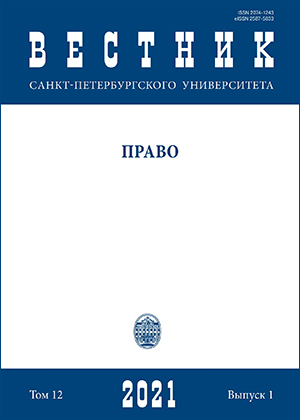The “concentration of public elements” theory and the arbitrability of disputes in Russia
DOI:
https://doi.org/10.21638/spbu14.2021.107Аннотация
This article is devoted to the analysis of the theory of concentration of public elements. The author explains the causes of this theory and its influence on the arbitrability of disputes in Russia. The causes of this jurisdictional theory are illustrated in the development of substantive law. The work emphasizes that the two sectors of civil turnover regulation, which have developed in Russia, largely affect the formation of dispute resolution mechanisms. This also applies to the issue of determining the range of disputes that the arbitral tribunal is entitled to accept for its consideration. The author stresses that there are no norms in the legislation on which the theory of concentration of public elements is based. It is generated exclusively by judicial decisions, which are not always consistent. This is evidenced by the fact that, despite the precedent nature of one of the decisions of the Supreme Court of the Russian Federation on the arbitrability of procurement disputes for the needs of certain types of legal entities, lower cassation courts refuse to recognize the arbitrability of this category of disputes. At the same time, they refer to the violation of public order when considering procurement disputes by arbitration courts. This is seen as some manipulation in which a conservative approach to the activities of arbitration courts is provided by the arbitrary involvement of various doctrines that have no basis in the law. The author predicts the negative consequences of the development of this doctrine, which will take place in the form of limiting the arbitrability of disputes considered by commercial arbitrations and in relation to other categories of cases in which a public element will be manifested to a greater or lesser extent.
Ключевые слова:
arbitration, commercial arbitration, concentration of public elements, arbitrability, court practice, internal arbitration, reform of arbitration
Скачивания
Библиографические ссылки
Загрузки
Опубликован
Как цитировать
Выпуск
Раздел
Лицензия
Статьи журнала «Вестник Санкт-Петербургского университета. Право» находятся в открытом доступе и распространяются в соответствии с условиями Лицензионного Договора с Санкт-Петербургским государственным университетом, который бесплатно предоставляет авторам неограниченное распространение и самостоятельное архивирование.






